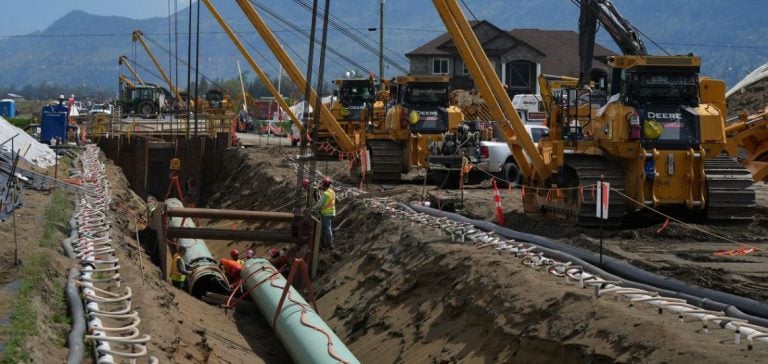Canadian Natural Resources Ltd (CNRL), one of Canada’s largest oil and gas producers, has undertaken a significant expansion of its transport and export capacity by increasing its share on the recently expanded Trans Mountain pipeline. This initiative follows a major acquisition from Chevron, which allowed CNRL to strengthen its assets in two of Canada’s most prolific oil-producing regions, the Athabasca oil sands and the Duvernay shale formation.
The significance of this transaction lies not only in the increase in available space on the pipeline but also in the broader strategic implications for CNRL’s ability to transport and market its products internationally, particularly to the Asia-Pacific region. This diversification is crucial in the current global oil market, where access to varied markets can protect Canadian producers against fluctuations in demand from the United States, their traditional export market.
Increased Pipeline Capacity
CNRL will take over a 75% increase in its space on the Trans Mountain pipeline, bringing its total capacity to 164,000 barrels per day (bpd). This increase represents a significant portion of the pipeline’s total capacity, which, after expansion, will be able to transport 890,000 bpd. The expansion of the pipeline is particularly important as Trans Mountain is one of the few major conduits in Canada for transporting oil from Alberta to the coast, facilitating access to foreign markets via the Port of Vancouver.
Chevron Deal
Earlier this month, Chevron agreed to sell its assets in the Athabasca oil sands and the Duvernay shale to CNRL for $6.5 billion. These regions are crucial to Canada’s oil production, with the Athabasca oil sands being one of the largest oil deposits in the world. Chevron’s acquisition has significantly expanded CNRL’s asset portfolio, and securing additional pipeline space ensures the company can efficiently move this increased production to market.
PetroChina’s Exit
PetroChina, through its Canadian subsidiary, was previously a committed shipper on the Trans Mountain pipeline. However, in a letter filed with the Canada Energy Regulator, the company indicated that it would no longer use its allocated space and had assigned its contracts to another party, now confirmed to be CNRL. This suggests a potential shift in PetroChina’s Canadian operations, as the company scales back its commitment to long-term oil transportation contracts in the region.
Strategic Importance of the Trans Mountain Pipeline
The Trans Mountain pipeline expansion is a critical infrastructure project for Canada’s oil industry. While the expansion faced numerous legal, environmental, and political challenges, its completion is seen as a major victory for Canadian oil producers, allowing them to bypass the bottleneck of pipeline capacity that has hindered industry growth. The pipeline is essential for exporting oil from Alberta to global markets, particularly in Asia, where demand for crude oil remains strong.
Long-Term Impact on Canadian Oil Exports
The increased shipping capacity will allow CNRL to diversify its export markets, reducing its reliance on U.S. buyers, who currently purchase the majority of Canadian oil. This diversification is particularly valuable as the United States increases its own oil production and could reduce its imports from Canada over time. By securing space on the Trans Mountain pipeline, CNRL ensures it has a direct route to the Asia-Pacific market, where demand is expected to remain robust. Moreover, the expansion of the pipeline could increase the price Canadian producers receive for their crude, as they are no longer forced to sell at a discount due to limited transportation options.
Broader Implications
This development solidifies CNRL’s position as a key player in Canada’s oil export infrastructure. By increasing its pipeline capacity, CNRL can move more crude oil to market, thus increasing its revenue streams and securing a competitive edge in the global oil market. The ability to ship larger volumes of oil is also a hedge against potential fluctuations in the North American market, as the company can now access buyers in Asia and other regions.
The Role of the Trans Mountain Pipeline in Canadian Energy Politics
The Trans Mountain pipeline has long been a point of contention in Canadian politics. Environmentalists and Indigenous groups have opposed its expansion due to concerns over the environmental risks of increased oil transportation, including the risk of oil spills along the British Columbia coast. However, for the oil industry and the Alberta government, the pipeline is seen as a lifeline for the province’s economy. With its expansion nearly complete and operations expected to begin in the second quarter of 2024, the pipeline is positioned to play a crucial role in shaping the future of Canada’s oil industry.
Economic and Environmental Tensions
While this expansion is a win for Canadian oil producers like CNRL, it will likely reignite debates around Canada’s energy future. Balancing economic growth tied to the oil industry with climate change commitments will continue to be a challenge. As global pressure mounts for nations to transition to cleaner energy, Canada’s role as a major oil exporter will be scrutinized, particularly as the country seeks to meet its carbon reduction targets.
Outlook for CNRL
For Canadian Natural Resources Ltd, this deal and the expanded pipeline capacity are crucial for the company’s long-term strategy. With the additional shipping capacity, CNRL can now focus on ramping up production from its newly acquired assets. The company’s ability to transport this increased production to global markets will be a key factor in its future profitability. Moreover, the additional space on the Trans Mountain pipeline secures CNRL’s position as a major player in the Canadian oil industry, ensuring its competitiveness in a challenging global market.






















